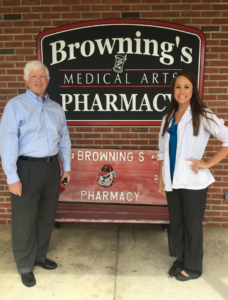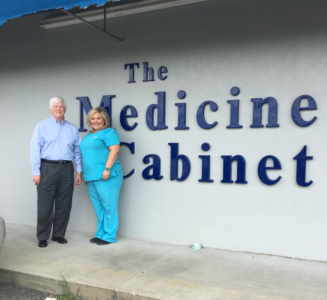A lollipop for the Aussies, Bob on the move, ensuring the best inattention, and more
23 Apr 2019
Posted by Andrew Kantor
Keeping up with Bob
While he’s traveling around the state, GPhA’s Bob Coleman likes to stop in at the pharmacies in the towns he’s visiting.
Here he is in Waycross with Holly Tanner at Browning’s Pharmacy, Jaime King at the Medicine Cabinet, and Donnie Griffin at Griffin’s Prescription Shop:
Neighborhood pharmacies are critical to adherence
When neighborhood pharmacies close, it’s bad news for people with heart conditions. Research from the University of Chicago finds that adherence rates for statins plummet when a pharmacy closes.
Looking at more than 3 million people with statin scripts, the researchers checked the adherence rates of the 93,000 of them whose pharmacy closed.
The researchers found that statin users in the closure cohort experienced “an immediate and significant decline in statin adherence” in the three months post-closure that was “largely due to the complete discontinuation of medication.” Among statin users, about 23.8% of people in the pharmacy closure cohort did not refill their prescription at any point during the 12-month follow-up period, compared with only 12.8% in the non-closure cohort.
Don’t call them “unused”
Remember that the first of two National Prescription Drug Take Back Days is coming this Saturday, April 27. That’s when the DEA makes a big push to get people to return their unneeded drugs, no questions asked. (Shout-out to PCOM student pharmacists who are helping out with the event in Snellville!)
You can go to takebackday.dea.gov and scroll down to find a drop-off location near you.
Active ingredient
We all know by now that the gut microbiome affects health in all sorts of ways, and tweaking it can have profound affects.
But just as willow-tree bark can cure a headache (but it’s really the acetylsalicylic acid — aka aspirin — that does the work), researchers are applying that same logic to gut bacteria. They’re looking to isolate what exactly the bacteria do to cause those positive effects. If they figure that out, maybe it could be put into pill form.
For example:
Scientists think one possibility is that gut bacteria, by fermenting starches in food such as oats and pulses, produce compounds called short chain fatty acids (SCFAs). One of these SCFAs is acetic acid – the main component of vinegar.
Once produced, these SCFAs activate specific receptor proteins in our body and these receptors, once activated, can provide health benefits.
The science is interesting, the grammar is horrible
“Increased Screen Time in Preschool Tied to Worse Inattention.” So if you want your kids to have the best inattention, keep them away from those screens.
Privacy, schmivacy
It seems that 29 of 36 smartphone apps that are supposed to help users with depression or smoking cessation sent data to Facebook or Google to help target ads. Only 12 of those 29 disclosed the fact. “As a result, users are denied an informed choice about whether such sharing is acceptable to them.”
The researchers suggestion? Don’t trust the apps’ policies. Instead, you “should reasonably assume that data will be shared with commercial entities whose own privacy practices have been questioned.”
Best Buy dips more toes into healthcare
The company is partnering with Tyto Care, maker of a $300 at-home ‘handheld examination device’ that can “examine the heart, lungs, skin, ears, throat and abdomen as well as measure body temperature to enable remote diagnosis of acute care situations.”
The company already acquired a medical-alert service, and has a program “to help adult children remotely check in on the health and safety of their aging parents,” notably to calm them down after they pay $200 for a Geek Squad “tune up.”
Elsewhere: I think this means they get a lollipop
After eight years, Australians are learning to wash their hands. “Between 2009 and 2017, increases were observed in national health-care facility participation and overall hand hygiene compliance.”
The long read: sharing the blame
“The Giants at the Heart of the Opioid Crisis” — the distributors.
[T]he daunting financial muscle that has driven the spread of prescription opioids in the United States comes from the distributors — companies that act as middlemen, trucking medications of all kinds from vast warehouses to hospitals, clinics and drugstores.





